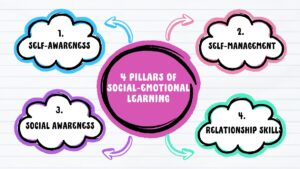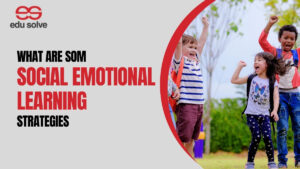
In today’s rapidly changing world, education goes beyond academic achievement. It encompasses the holistic development of individuals, nurturing not just their intellectual capacities but also their emotional intelligence and social skills. One approach gaining significant traction in educational circles is Social Emotional Learning (SEL). SEL equips students with essential life skills that go beyond traditional academic subjects.
Contents
- 1 Benefits of Social Emotional Learning (SEL) Integration in the Classroom
- 1.1 1. Enhanced Self-Awareness
- 1.2 2. Improved Self-Regulation
- 1.3 3. Better Social Skills
- 1.4 4. Increased Empathy
- 1.5 5. Effective Communication
- 1.6 6. Conflict Resolution
- 1.7 7. Stress Reduction
- 1.8 8. Improved Decision Making
- 1.9 9. Increased Motivation
- 1.10 10. Positive Behavior
- 1.11 11. Resilience
- 1.12 12. Healthy Relationships
- 1.13 13. Enhanced Academic Performance
- 1.14 14. Reduced Bullying
- 1.15 15. Better Classroom Environment
- 1.16 16. Preparation for the Future
- 1.17 17. Promotion of Diversity and Inclusion
- 1.18 18. Emotional Resonance
- 1.19 19. Parental Involvement
- 1.20 20. Community Engagement
- 1.21 21. Reduction in Disciplinary Issues
- 1.22 22. Improved Mental Health
- 1.23 23. Cultivation of Leadership Skills
- 1.24 24. Long-Term Success
- 1.25 25. Building a Kinder Society
- 2 Conclusion
Benefits of Social Emotional Learning (SEL) Integration in the Classroom
Let’s delve into 25 compelling benefits of integrating SEL in the classroom:
1. Enhanced Self-Awareness
SEL encourages students to explore and understand their own emotions, thoughts, and values. By recognizing their strengths and weaknesses, students gain a deeper understanding of themselves, which is essential for personal growth and development.
2. Improved Self-Regulation
Through SEL, students learn strategies to manage their emotions, impulses, and behaviors effectively. This includes techniques such as deep breathing exercises, mindfulness practices, and positive self-talk, which help students regulate their responses in various situations.
3. Better Social Skills
SEL emphasizes the importance of interpersonal relationships and communication skills. By learning to listen actively, communicate assertively, and collaborate with others, students develop strong social skills that are vital for success both in and out of school.
4. Increased Empathy
Empathy is the ability to understand and share the feelings of others. SEL activities, such as perspective-taking exercises and role-playing scenarios, help students develop empathy by encouraging them to consider different points of view and recognize the emotions of their peers.
5. Effective Communication
SEL teaches students how to express themselves clearly and respectfully, both verbally and non-verbally. By practicing active listening, using “I” statements, and recognizing body language cues, students become better communicators who can express their thoughts and feelings effectively.
6. Conflict Resolution
Conflict is a natural part of life, but knowing how to resolve conflicts peacefully is a valuable skill. SEL provides students with strategies for managing conflicts constructively, such as using “I” messages, finding common ground, and brainstorming solutions together.
7. Stress Reduction
In today’s fast-paced world, stress is a common experience for many students. SEL equips students with coping mechanisms to manage stress and anxiety, such as relaxation techniques, time management skills, and positive self-talk, promoting overall well-being.
8. Improved Decision Making
Decision-making is a critical skill that influences every aspect of life. SEL helps students make informed and responsible decisions by considering the potential consequences of their actions, weighing different options, and seeking input from others when necessary.
9. Increased Motivation
SEL fosters a sense of purpose and intrinsic motivation by helping students connect their personal values and goals with their actions. When students understand the relevance of their learning and feel a sense of autonomy and mastery, they are more likely to be engaged and motivated to succeed.
10. Positive Behavior
SEL promotes pro-social behaviors such as kindness, empathy, and cooperation while discouraging negative behaviors such as aggression, bullying, and defiance. By creating a positive classroom environment where these behaviors are valued and reinforced, SEL helps cultivate a culture of respect and mutual support.
11. Resilience
Resilience is the ability to bounce back from setbacks and adversity. SEL teaches students to develop resilience by fostering a growth mindset, teaching problem-solving skills, and providing opportunities for reflection and self-improvement.
12. Healthy Relationships
SEL lays the foundation for healthy, supportive relationships by teaching students how to set boundaries, communicate effectively, and resolve conflicts respectfully. These skills are essential for building strong friendships, maintaining positive family relationships, and navigating romantic partnerships.
13. Enhanced Academic Performance
Research has shown that students who participate in SEL programs tend to have higher academic achievement, including better grades, test scores, and graduation rates. This may be due to improved attention and focus, better self-regulation, and stronger relationships with teachers and peers.
14. Reduced Bullying
Bullying is a significant concern in schools, but SEL can help prevent and address bullying behavior by promoting empathy, teaching conflict resolution skills, and fostering a culture of inclusion and respect. When students feel connected to their peers and supported by adults, they are less likely to engage in bullying or tolerate it from others.
15. Better Classroom Environment
SEL contributes to a positive classroom climate characterized by mutual respect, trust, and collaboration. When students feel safe, valued, and supported, they are more likely to take risks, ask questions, and participate actively in learning activities, creating a vibrant and engaging learning environment for all.
16. Preparation for the Future
SEL equips students with essential life skills that are valuable in various contexts, including college, careers, and personal relationships. Whether navigating the complexities of higher education, entering the workforce, or starting a family, SEL provides a solid foundation for success and well-being in the future.
17. Promotion of Diversity and Inclusion
SEL promotes an understanding and appreciation of diversity by celebrating differences and challenging stereotypes. By creating a welcoming and inclusive environment where every student feels valued and respected, SEL fosters a sense of belonging and unity within the school community.
18. Emotional Resonance
Teachers trained in SEL are better equipped to recognize and respond to students’ emotional needs. By showing empathy, providing emotional support, and building trusting relationships with their students, teachers create a safe and nurturing learning environment where students can thrive academically and emotionally.
19. Parental Involvement
SEL initiatives often involve parents and caregivers, providing opportunities for them to learn about SEL concepts and strategies and support their children’s socio-emotional development at home. When parents and schools work together as partners in education, students receive consistent messages and support across different environments, reinforcing their social and emotional learning.
20. Community Engagement
SEL encourages students to become active participants in their communities by volunteering, advocating for social causes, and contributing to positive change. By instilling a sense of civic responsibility and empathy for others, SEL fosters a culture of service and social justice that extends beyond the classroom walls.
21. Reduction in Disciplinary Issues
SEL has been linked to a decrease in disciplinary problems such as suspensions, expulsions, and referrals to the principal’s office. By promoting self-awareness, self-regulation, and responsible decision-making, SEL helps prevent behavioral issues and create a more peaceful and orderly school environment.
22. Improved Mental Health
SEL initiatives have been shown to have a positive impact on students’ mental health, reducing symptoms of anxiety, depression, and other mental health disorders. By teaching coping skills, promoting emotional well-being, and providing access to support services, SEL contributes to a healthier and more resilient student body.
23. Cultivation of Leadership Skills
SEL fosters leadership qualities such as empathy, communication, collaboration, and problem-solving, which are essential for effective leadership in any context. By empowering students to lead by example, take initiative, and inspire others, SEL cultivates the next generation of ethical and visionary leaders.
24. Long-Term Success
The skills and competencies acquired through SEL lay the foundation for long-term success and well-being in both personal and professional domains. Whether pursuing higher education, entering the workforce, or starting a family, SEL provides students with the tools they need to navigate life’s challenges, build fulfilling relationships, and achieve their goals.
25. Building a Kinder Society
Ultimately, integrating SEL in education contributes to the creation of a kinder, more empathetic society where individuals thrive and support one another. By nurturing students’ social and emotional development, SEL promotes a culture of compassion, cooperation, and mutual respect that extends beyond the classroom to create positive change in the world.
These benefits highlight the transformative power of Social Emotional Learning in education, paving the way for a brighter future where students are not only academically successful but also emotionally intelligent, socially competent, and morally.
Conclusion
In conclusion, Social Emotional Learning offers a myriad of benefits that extend far beyond the classroom walls. By nurturing students’ emotional intelligence, SEL equips them with the skills and competencies necessary to navigate life’s challenges, build meaningful relationships, and contribute positively to society. As educators and stakeholders recognize the importance of socio-emotional development, integrating SEL in the classroom becomes not just an option but a necessity in preparing students for success in the 21st century and beyond.
Ready to learn more about SEL?
Transform your educational landscape with EDU-SOLVE‘s dynamic services. Embrace culturally affirming community engagement, empower leaders through executive training, and harness the power of federal programs and resource development. Elevate your institution with our expertise in Multi-Tiered System of Supports (MTSS), Social Emotional Learning, Systems Building, and Strategic Planning. Join us in shaping a brighter educational future. Take action today for impactful and inclusive solutions . Let’s build a thriving educational community together!
Also Read:







No comment yet, add your voice below!